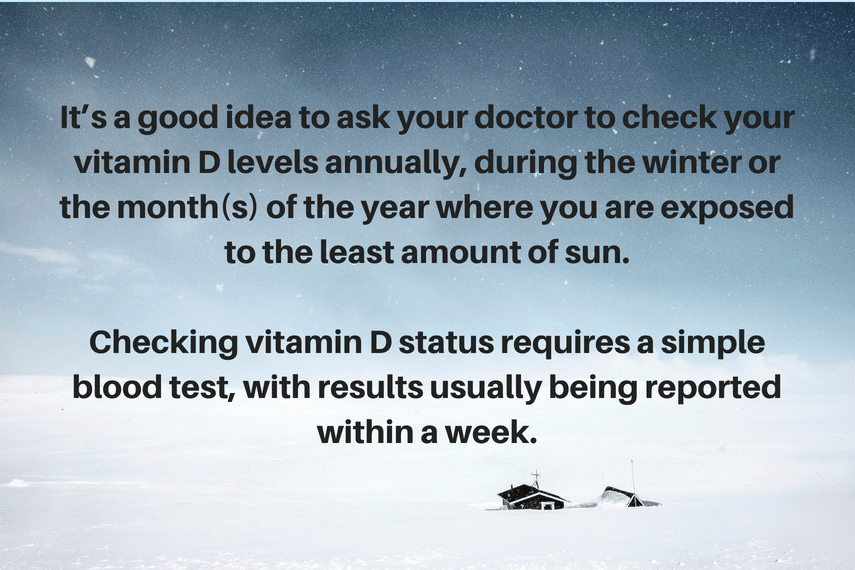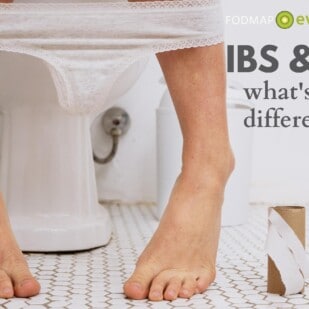Vitamin D & IBS: Is There a Connection?
Vitamin D has become a nutritional darling over the past several years and has been linked to beneficial effects on bone health, diabetes prevention, immune health, cardiovascular function and more.
Newer research indicates a possible role for vitamin D in preventing certain types of cancer and colorectal disease, and favorable effects on neuropsychiatric disorders, such as anxiety and depression[1] [2].
But is there a connection for IBS sufferers and individuals following a low FODMAP diet? Before you start popping lots of supplements, let’s take a closer look.

What is Vitamin D’s Role in the Body?
Vitamin D is first and foremost a regulator of bone health. It works in concert with calcium and phosphorus to ensure strong and healthy bones. It’s also critical for muscle function, brain development, respiratory and cardiac health[3] [4].
Vitamin D is the one of very few vitamins that our bodies can make naturally (Vitamin K is the other. It is produced in our GI tract via the gut bacteria’s fermentation of fiber) and is produced by exposure of our skin to the sun.
It is then converted by the liver to a different form of vitamin D (D3) and used by our body for many important functions. However, many individuals do not get sufficient exposure to the sun all or part of the year to make enough vitamin D.
Worldwide Vitamin D Deficiency: Many Individuals Have Insufficient Levels
It is estimated that worldwide, some 1 billion people, or about 15% of the world’s population are vitamin D insufficient or deficient[5] (with blood levels registering less than 20 ng/ml or between 20-30 ng/ml, respectively).
Individuals who live at latitudes greater than 37°, those with darker skin (skin pigmentation can prevent sufficient absorption of UV radiation needed to produce vitamin D)[6], aging individuals, and those with poor diets and/or chronic diseases are at greater risk for deficiency.
Malabsorption of nutrients that often accompanies GI disorders such as celiac disease and Crohn’s disease can also negatively affect an individual’s vitamin D status.[7]

IBS & Vitamin D: An Interesting Relationship
Irritable bowel syndrome (IBS) and inflammatory bowel disease (IBD) are increasingly common throughout the world. IBS is estimated to affect between 10-20% of the worldwide population[8] [9], with varying levels of prevalence depending on the country or region.
And, a 2015 study indicated that more than 1 million Americans and 2.5 million Europeans have IBD (inflammatory bowel disease, which includes Crohn’s disease and ulcerative colitis).[10] Each condition has different etiologies or causes, but they often share similar symptoms and can be affected by similar dietary or nutritional strategies.
Studies on both IBS and vitamin D have been converging. IBS has long been linked to mental health issues, such as stress, anxiety and depression[11] due to dysregulation of the gut-brain axis[12]. In fact, some 50-90% of IBS patients seeking treatment also have psychiatric disorders, especially depression and anxiety[13].
Tellingly, vitamin D status is also closely linked with many of these same issues. Individuals with low or deficient vitamin D status are more likely to suffer from anxiety and depression than individuals with sufficient vitamin D levels[14]. So, it’s not surprising that scientific researchers are now seeing some direct connections between IBS and IBD and vitamin D status.
Perhaps most importantly, some studies have shown that there is an inverse relationship between IBS symptoms and vitamin D status. Put simply, the lower a person’s vitamin D levels, the worse their symptoms may be. But why is this?
Factors that May Affect Vitamin D Status in IBS Sufferers
It’s still unclear exactly why IBS sufferers seem to be low in vitamin D, and what is “chicken” and which is “egg.” Are individuals who are deficient in vitamin D more likely to develop IBS, or is IBS somehow interfering with vitamin D status?
Scientists have offered some possible connections or explanations[18], including impaired absorption of vitamin D in IBS and IBD sufferers due to inflammation or intestinal damage, increased excretion or losses of vitamin D due to problems with diarrhea or fat malabsorption (vitamin D is a fat-soluble vitamin) or insufficient pancreatic enzymes.
Other theories look at poor intake of vitamin D-containing foods due to individuals eating vary limited diets because GI discomfort. Finally, many individuals with IBS may feel bad a lot of the time and not spend much time outdoors, thereby not getting enough sun exposure to produce vitamin D.
So now we know there’s a connection between vitamin D and IBS and IBD, but we’re not sure exactly what that entails. What to do?
Recommendations: The Bottom Line
-
- IBS sufferers should have their vitamin D levels regularly monitored. Annual checks are important to track trends. (See call out box for information on appropriate levels).
- Focus on eating foods that have significant amounts of vitamin D, such as mushrooms, fatty or canned fish, egg yolks, beef liver, fortified tofu, cheese, and fortified milk, cereal or juices. *Choose low FODMAP versions of these when appropriate for your personal tolerance levels.
- Get safe sun exposure when possible (e.g. 15-30 minutes of sun exposure prior to applying sunscreen. *Note: The time required to produce sufficient vitamin D will differ by skin type, age, where you live and skin color. The Vitamin D Council offers some good tips for how to decide what may be right for you.
- For individuals at risk of vitamin D deficiency, the Endocrine Practice Guidelines Committee recommends a maintenance dose of at least 1000 IU vitamin D (D2 or D3)[19].
- Individuals who are deficient in vitamin D should follow the specific recommendations provided by their doctor. Depending on your blood levels of vitamin D, you may require daily supplementation of 2,000 IU or weekly supplementation of between 10,000 to 50,000 IU over a period of weeks to raise blood levels appropriately.[20]
- Talk to your doctor and/or dietitian before taking any vitamin, mineral or herbal supplement. In the case of vitamin D, as a fat-soluble vitamin, it can be toxic in excess. Improper doses can interfere with bone metabolism and/or cause damage the heart, blood vessels or kidneys[21]. Thus, more is not always better!
What are normal levels of vitamin D and how do you know what yours is?
There is no one agreed upon global standard for vitamin D levels, however the Institute of Medicine (USA) states that blood levels of vitamin D (25(OH)D) should be greater than 50 nmol/L to meet the needs of 97.5% of the population[1]. Thus, levels < 50 nmol/L are considered insufficient, and less than 30 nmol/L is considered deficient.
Recommended Dietary Allowances (RDAs) for Vitamin D
| Age Group | RDA |
|---|---|
| 0-1 years of age | 400 IU |
| 1-18 years of age | 600 IU |
| 19-50 years of age | 600 IU |
| 50-70 years of age | 600 IU |
| 70+ years of age | 800 IU |
For more helpful articles to help you with your FODMAP journey, check out Getting Started on The Low FODMAP Diet as well as an article to help you navigate Exercise, while dealing with IBS.
References
[1].LD, M. W. R. D. N. Vitamin D: Health benefits, facts, and research. Medical News Today (2017). Available at: https://www.medicalnewstoday.com/articles/161618.php. (Accessed: 20th March 2018)
[2] Depression and Vitamin D Deficiency: Is There a Connection? Healthline Available at: https://www.healthline.com/health/depression-and-vitamin-d#connection. (Accessed: 20th March 2018)
[3] Harbolic, B. K. Vitamin D Deficiency Symptoms, Signs, Treatment & Causes. MedicineNet(2016). Available at: https://bit.ly/2sDccLi (Accessed: 19th March 2018)
[4] Pfotenhauer, K. M. & Shubrook, J. H. Vitamin D Deficiency, Its Role in Health and Disease, and Current Supplementation Recommendations. The Journal of the American Osteopathic Association117,301 (2017).
[5] IBID.
[6] Harris, S. S. Vitamin D and African Americans. The Journal of Nutrition136,1126–1129 (2006).
[7] Holick, M. F. Vitamin D Deficiency. New England Journal of Medicine357,266–281 (2007).
[8] Endo, Y., Shoji, T., & Fukudo, S. (2015). Epidemiology of irritable bowel syndrome. Annals of Gastroenterology : Quarterly Publication of the Hellenic Society of Gastroenterology, 28(2), 158–159.
[9] Longstreth GF, Thompson WG, Chey WD, Houghton LA, Mearin F, Spiller RC. Functional bowel disorders. Gastroenterology. 2006;130:1480–91.
[10] Kaplan, G. G. The global burden of IBD: from 2015 to 2025. Nature Reviews Gastroenterology & Hepatology12,720–727 (2015).
[11] North CS, Hong BA, Alpers DH. Relationship of functional gastrointestinal disorders and psychiatric disorders: Implications for treatment. World J Gastroenterol 2007; 13(14): 2020-2027
[12] Kennedy, P. J., Cryan, J. F., Dinan, T. G., & Clarke, G. (2014). Irritable bowel syndrome: A microbiome-gut-brain axis disorder? World Journal of Gastroenterology : WJG, 20(39), 14105–14125. https://doi.org/10.3748/wjg.v20.i39.14105
[13] Lydiard RB, Falsetti SA. Experience with anxiety and depression treatment studies: implications for designing irritable bowel syndrome clinical trials. Am J Med. 1999;107:65S-73S
[14] Greenblatt, J. M. Psychological Consequences of Vitamin D Deficiency. Psychology TodayAvailable at: https://www.psychologytoday.com/blog/the-breakthrough-depression-solution/201111/psychological-consequences-vitamin-d-deficiency. (Accessed: 19th March 2018)
[15] Del Pinto R, Pietropaoli D, Chandar A, Ferri C, Cominelli F. Association between inflammatory bowel disease and vitamin D deficiency: a systematic review and meta-analysis. Dig Liver Dis. 2016;48:E161
[16] University of Sheffield. News. Large proportion of IBS sufferers are vitamin D deficient – Latest – News – The University of Sheffield(2015). Available at: https://www.sheffield.ac.uk/news/nr/most-ibs-sufferers-are-vitamind-deficient-1.535569. (Accessed: 19th March 2018)
[17] Nwosu, B., Maranda, L. and Candela, N. (2017). Vitamin D status in pediatric irritable bowel syndrome. PLOS ONE, 12(2), p.e0172183.
[18] Mouli, V. and Ananthakrishnan, A. (2013). Review article: vitamin D and inflammatory bowel diseases. Alimentary Pharmacology & Therapeutics, 39(2), pp.125-136.
[19]Holick, M. F. et al.Evaluation, Treatment, and Prevention of Vitamin D Deficiency: an Endocrine Society Clinical Practice Guideline. The Journal of Clinical Endocrinology & Metabolism96,1911–1930 (2011).
[20] Mouli, V. and Ananthakrishnan, A. (2013). Review article: vitamin D and inflammatory bowel diseases. Alimentary Pharmacology & Therapeutics, 39(2), pp.125-136.
[21] Office of Dietary Supplements – Vitamin D. NIH Office of Dietary SupplementsAvailable at: https://ods.od.nih.gov/factsheets/VitaminD-HealthProfessional/. (Accessed: 19th March 2018)
![Woman grabbing her head with both hands in despair. Studies on both IBS and vitamin D have been converging. IBS has long been linked to mental health issues, such as stress, anxiety and depression[11] due to dysregulation of the gut-brain axis[. In fact, some 50-90% of IBS patients seeking treatment also have psychiatric disorders, especially depression and anxiety.](https://www.fodmapeveryday.com/wp-content/uploads/2018/06/adult-alone-black-and-white-551588-855x570.jpg)








